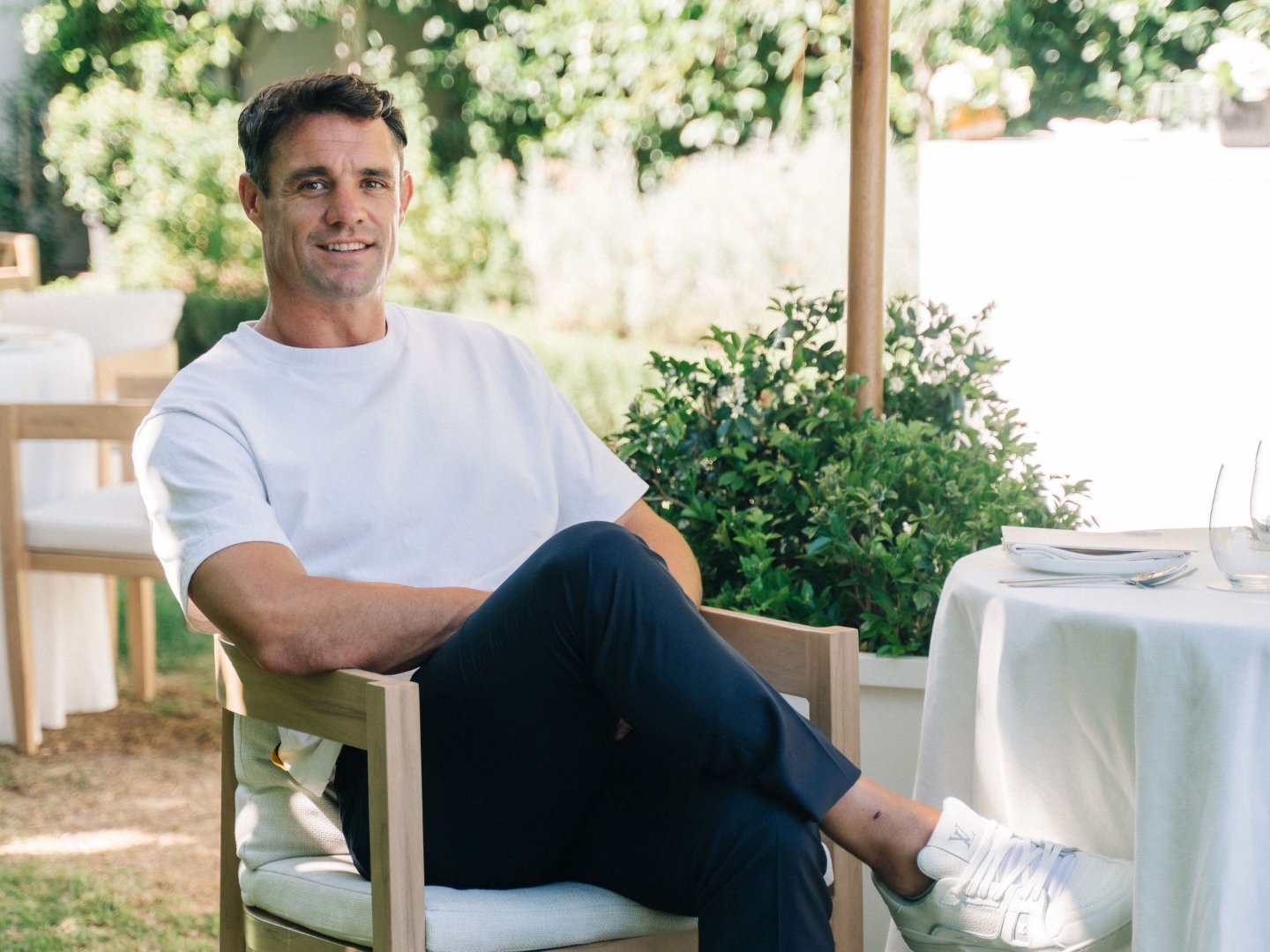
One of the greatest rugby players in history, Dan Carter is a bona fide legend (Photo: Louis Vuitton)
Ask anyone who knows the difference between a maul and a scrum or a flying wedge versus a cavalry charge and chances are they would immediately perform a “we are not worthy” kowtow should Daniel William Carter ONZM be presented before them. One of the greatest rugby players in history, Dan Carter is a bona fide legend, having played for close to two decades, racking up over 100 Test matches for New Zealand, winning two Rugby World Cups, and being crowned top international points scorer in Test Rugby with a tally of 1,598 points and most-capped All Blacks fly-half of all time, in the process.
The 42-year-old, who retired from playing rugby professionally in 2021 has been thrust back into the spotlight of late due to his role as house ambassador for Louis Vuitton and, more specifically, his collaborative work with the maison, revealing itself in the form of the Malle Vestiaire or “wardrobe trunk”. Designed and crafted by the brand’s team of legendary artisans in Asnières, it was unveiled in the run-up to last year’s Rugby World Cup in Paris, France.
Trunk show
However, it was tennis and not rugby that brought Carter to meet the press in Australia recently. He was flown in by the maison to watch the finals of the 2024 Australian Open and visit its Savoir Rêver showcase, a special event where selected guests could engage with and immerse themselves in the house’s celebrated sense of savoir-faire and feast their eyes on limited-edition objets d’art, travel-inspired furniture and one-of-a-kind trunks. Louis Vuitton chose a historic Italianate-style mansion in the exclusive suburb of Hawthorn, Melbourne, for the occasion, which happened concurrently with the first Grand Slam tournament of the year.
The easygoing sporting legend was taken around the different rooms, which featured spectacular pieces of furniture such as Marc Newson’s famed Cabinet of Curiosities and the disco ball-inspired Cocoon chair by the Campana Brothers, before stopping at his very own Malle Vestiaire.
Carter’s one-of-a-kind bespoke trunk — easily recognisable to fans due to a few distinctive logos and numbers, such as “DC10”, which references his shirt number, and “1598”, the points he has scored in international rugby — contains some of his most precious sports equipment and memorabilia. There are his three World Rugby Player of the Year awards, three Rugby World Cup medals, two 100th-test caps, two jerseys he wore to Rugby World Cups (“There were three originally but, yeah, there are only two today,” he says with a good-natured grin) and the rugby ball he created in collaboration with Louis Vuitton in 2019.
dan_carter_for_lv_2.jpg
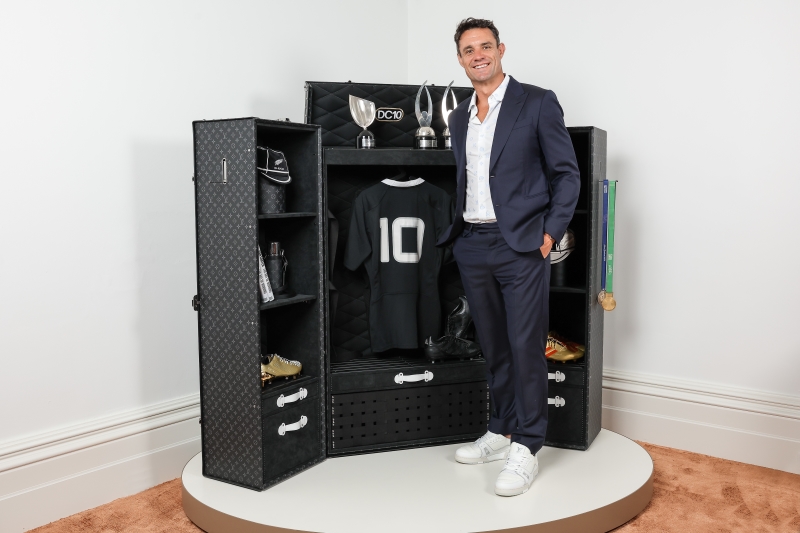
Carter was born in New Zealand and raised by Neville aka “Snibby”, his builder father, and Bev, his schoolteacher mother, in Southbridge, a small rural farming community about an hour from Christchurch on South Island. Louis Vuitton and its representation of luxury might seem a world away from his idyllic Kiwiana childhood but Carter has long been a fan of the maison and its wares, still wearing and cherishing the pieces he bought overseas while touring the world as a young player.
“You can see the rugby ball we collaborated on about five years ago for the Japan World Cup. That was a lot of fun. I still pinch myself sometimes when I think about working alongside such an iconic brand, talking and exploring ideas with the design team on how an object could look by using different leathers … even coming to a beautiful house like this to see such incredible craftsmanship and to think there’s a piece in there that you actually collaborated on. It is profound the way they pay attention to detail, leaving no stone unturned and making sure everything is just beautiful.
“Besides showcasing interesting visual pieces that really represented some of the achievements I made throughout my career, I wanted a trunk that would evoke the excitement of getting ready for a match,” explains Carter about the unique Malle Vestiaire. “I love rugby boots and we have three pairs in there — one pair which I used for my 100th game and collaborated with Adidas for, another that I wore to play in the 2015 Rugby World Cup and the last, my ‘retirement’ boots.”
Bookworms — or CEOs — would also notice copies of his leadership book, The Art of Winning, released just last year. “It was quite a challenge transitioning from rugby to life-after-rugby, so when I retired, I used the process of writing a book to help me figure out what I was most passionate about. So, The Art of Winning is less of a book on rugby but more on leadership. The All Blacks is a special culture unto itself and you learn a lot. There are many lessons I picked up from playing within that environment. I didn’t realise it at the time but, having written the book, I see a lot of the information can be translated [into real life]. Also, when you think about rugby and the All Blacks in particular, you would definitely think of the All Blacks jersey. [When envisioning the Malle Vestiaire], I wanted it to be able to represent a changing room where all my rugby equipment is around me.
“Going through the whole process was a lot of fun, learning a lot along the way. It’s pretty amazing and very, very special to go home to New Zealand, leaving them to produce it, and then seeing it [as a finished product] for the very first time. It is the most magical moment. And I remember almost being in tears at having this dream, watching it become a reality. So much work goes into creating a single Louis Vuitton item. So, being able to showcase it with some very personal pieces from my career … Well, that’s just icing on the cake!”
dan_carter_the_art_of_winning.jpg
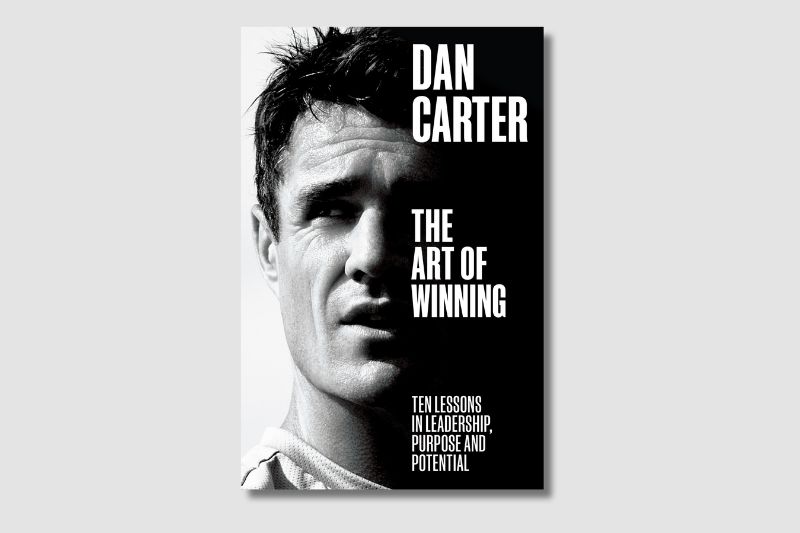
Off-pitch perfect
Those who have hit the pinnacle of their careers would know that transitioning to the next phase is never easy. After all, where does one go from the top? Carter’s answer, however, is not limited to a single destination. “I like keeping busy,” he smiles matter-of-factly. “To be honest, the initial easing out of rugby was challenging. For close to 20 years, I had that crystal-clear purpose of knowing who I was and what I wanted to be. Rugby gave me that. I would wake up every morning wanting to be the best player in the world. That was what drove me and got me through the setbacks or injuries that came my way.
"So, when I was no longer playing, admittedly there was that little loss of identity. Like, who was I if I wasn’t Dan Carter, the rugby player? It took some adjustment but I also realised how grateful I am for my family and the life I live. We have a nice house and my children are educated and have access to nutritious food on a daily basis — most of which was because of rugby. So I want to use my platform to give back and help others. Also, creating social impact was something I really wanted to strive towards in this next chapter of my life.”
This would materialise in Carter’s partnership with Unicef Aotearoa, which has been working across four of the hardest-to-reach areas of the Pacific to deliver essentials, like safe water, sanitation and hygiene solutions, to thousands of children and their families for two years now as well as his being appointed the first-ever leader in practice with the Oxford Foundry, which is the University of Oxford’s multidisciplinary entrepreneurship centre. It was founded by names like Reid Hoffman and Biz Stone, co-founders of LinkedIn and Twitter respectively, and launched in 2017 by Apple CEO Tim Cook.
“Dan is an incredible role model,” says Ana Bakshi, the Oxford Foundry’s executive director. “As one of the greatest sports legends of our time, he is an inspirational example to our future entrepreneurs and leaders. Throughout his rugby career, he has shown what can be achieved when you boldly pursue ambitious goals, have self-belief, and proactively acquire the skills to help you achieve them.” Carter’s work and strategic counsel with the Oxford Foundry will help inspire students, alumni and communities at large to gain the expertise and mindset needed to succeed in their chosen careers.
Giving back is second nature to the sporting great. Carter, in fact, himself relied upon the guidance of former mentor and advertising executive Kevin Roberts when he wanted to repurpose his life post-rugby.
“It emerged that I would always be passionate about leadership, high performance and winning. It was Kevin who put me in contact with the Oxford Foundry. This was during the pandemic still, when students weren’t able to go to class. So, our partnership produced an e-learning platform where I could share a lot of the lessons learnt from playing rugby for close to 20 years. Through this, I’ve also been able to interview people of calibre for the university. In fact, Reid was one of the first. He’s so successful in his own right, what with LinkedIn and all. Having a dialogue with people like him was a steep learning curve for me as well.
dsc06858.jpg
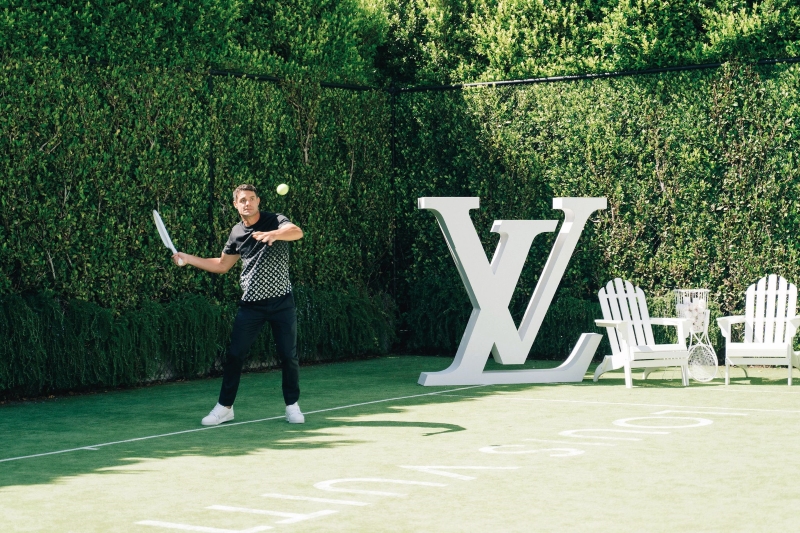
Mental matters
Fully aware that young people often look up to sporting greats, Carter says it is important to relay the message that “life is not perfect. It has its challenges. And that’s why I want to share, through The Art of Winning, that no one lives a perfect life. There are good days, there are bad days. You will experience disappointments. You are going to have setbacks. You are not going to achieve every goal you set out to achieve. All that matters is understanding [you need to embrace] the learning process, have a growth mindset and simply want to try and be a better version of yourself each and every day”.
Physical strength is an obvious attribute when it comes to achieving success as a rugby player but Carter lets on that mental strength and resilience are equally paramount. “We as athletes spend so much time on our physical strength, be it out on the field or in the gym, but little to none on our mental strength. You know, when I first started playing, if you spent time talking to psychologists, your teammates would think you’re a little bit crazy. There was a lot of stigma. You were just expected to roll up your sleeves, not talk about it and move on. In other words, just get on with it,” he says, shaking his head. “But I once found myself in a situation of not being able to deal with the pressure and where I needed help.”
Those are frightening words to hear considering the ever-mounting number of retired rugby players who struggle with anxiety and depression, particularly if they have suffered three or more concussions. Thankfully, the All Blacks had a team psychologist, Gilbert Enoka, on its staff and whom Carter immediately sought out. “I knew Gilbert was there to assist so I asked [for help]. My mind then was just all over the place and he gave me some tools to enable me to focus on the present. Yes, you could say it was a brave move. But now, learning just how much it can help you in your performance and daily life, I wish I had asked for help earlier!”
Citing the importance for everyone, athletes or otherwise, to have the right aids with which to maintain calmness and clarity, Carter stresses the need, now more than ever, to build mental resilience, deal with pressure and setbacks, and handle disappointments. “A concept that has been pivotal in my career is the battle between the ‘blue head’ and the ‘red head’, when stress, frustration and pressure mount.
"Life is not about avoiding the red moments but how quickly you can return to blue, regaining control over your thoughts and actions and [being] focused on the task at hand. There will always be pressure in life, whether it stems from knowing millions of people are watching you or overcoming a series of mistakes. Seeking help was hugely beneficial to me and, by the end of my rugby career, perceptions of those who do so completely changed. It is now a case of how you are crazy if you aren’t seeing a psychologist!
2023-10-28t194529z_782581154_mt1abcpr873813017_rtrmadp_3_abaca-press.jpg
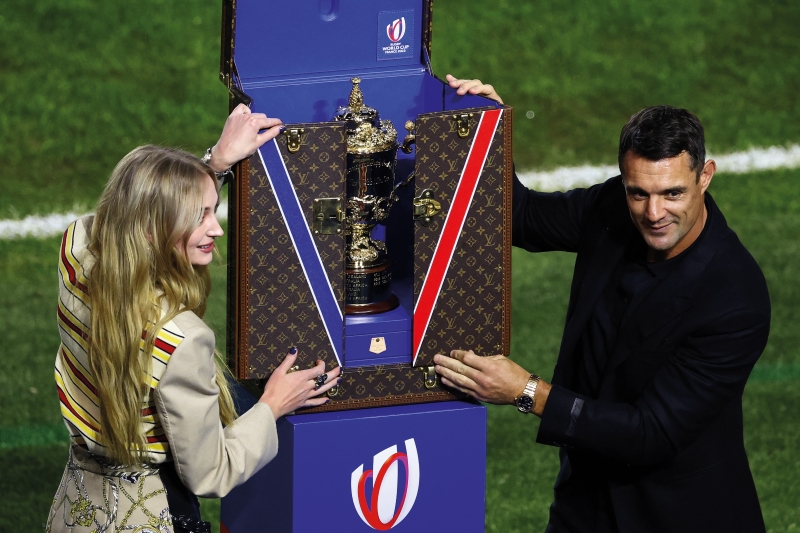
On the edge of greatness
The Carter coterie would also be familiar with one of his aphorisms on how walking towards pressure is akin to being on the edge of greatness. “I love that,” he affirms. “We used to see pressure as a bit of a burden. I mean, I didn’t like [it] in my life and there were certain games, situations, in which we lost because we couldn’t think clearly [in high-pressure situations]. Just look at the most successful people around, in business and sport, they live under pressure every day, forever. As soon as you change your mindset, to actually embrace and walk towards it, that’s the game changer right there!”
It certainly helps that the haka — the traditional warrior’s challenge now adopted and adapted by the All Blacks — remains one of the most hypnotic and rousing pre-match rituals to watch, and is certain to dispel any lingering doubts in the head. “It is part our special history here in New Zealand; it’s our identity,” Carter says. “We perform it to set the challenge. And not because we think it gives us the advantage. We don’t want to be so worked up that we end up giving away a lot of our energy. And people can react to it however they want. We perform the haka, yes, but then we get back in the huddle, breathe, get our heart rate down and our minds back on the game. We always start the game focused on the tactics and the process. But, undoubtedly, the haka is a very special part of our culture.”
Some of Carter’s longstanding fans might remember the hard times, though. “I learnt more from the disappointments and losses than the victories,” he acknowledges. “I am the person I am today not because of the World Cup victories or the Player of the Year awards. It is the learnings I got after serious injuries or World Cup playoff losses. It is how I learnt to deal with those situations that made me even stronger. So, to the young people out there, be brave. Try new things that challenge you without fear of failure. Because that’s where the growth is!”
But, despite consistently reaching higher heights, Carter, displaying the most Kiwi of traits, remains grounded and humble as ever. “It’s an All Blacks thing,” he shares, adding how Steve Tew, the former CEO of New Zealand Rugby, would kick his shoes after each good game. “It’s a light-hearted reminder to check that our feet are still firmly on the ground.”
The road ahead
Listening to him relate how his childhood dream — and that of every Kiwi child, might we add — was to be an All Black, it is wild to think that he made it come true and actually lived the dream. “That’s all I ever wanted to do. My father played rugby himself and mine was a very simple childhood; a lot of outdoorsy games after school, during lunch and all through the weekends with the whole community. We would gravitate to the local club where my friends, most of us lived on farms, and I would play. We would then watch the adults play later in the day. Rugby was a big part of our lives and upbringing and my parents were very encouraging, supporting me until that dream became a reality.”
Rugby and philanthropy aside, what remains most important to Carter is his family: wife Honor, a former hockey international, and their four boys, Marco, Fox, Rocco and Cruz. “All I can say is that my wife and I are both very competitive, especially when we compete in the backyard … even if it’s on DIY water slides,” he laughs. “The kids now play practically every sport — hockey, rugby, football, tennis, swimming, basketball … everything. Our eldest just turned 11, our youngest is almost three … so there’s still a long way to go. But I think it’s important to try everything at that age before gravitating towards one over time. And I am sure sports will be a big part of their lives always.”
Taking a moment out to muse on the path ahead, Carter acknowledges with full gratitude that it has been a very special 20 years playing rugby professionally. He adds, however, that “if I just sit here telling old rugby stories, I would not progress in life 20 years on. I have a strong growth mindset and would love to make real social impact. Exactly how, I am still figuring that one out”. Only 42, he has a lifetime ahead to go. But whatever legacy the fine Mr Carter leaves behind, it is already clear it will extend well beyond just sport.
This article first appeared on Apr 8, 2024 in The Edge Malaysia.


